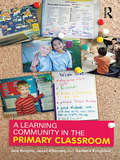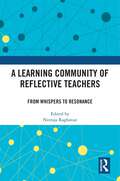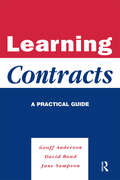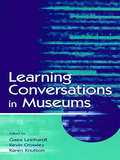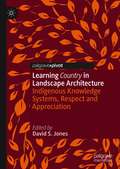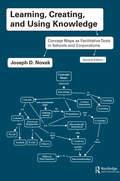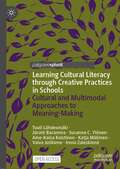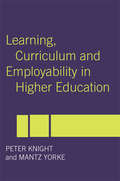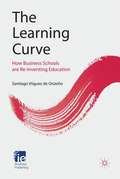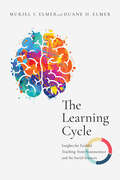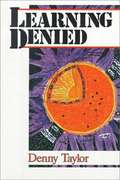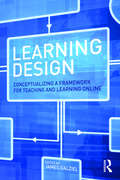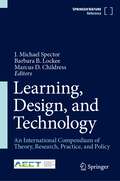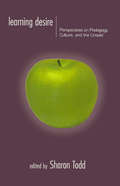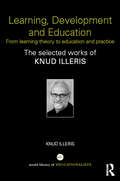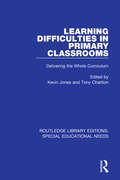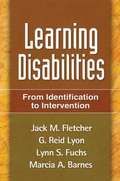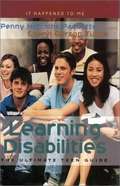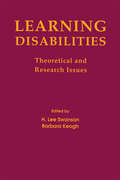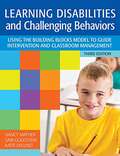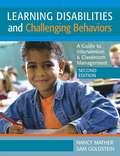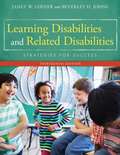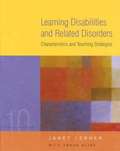- Table View
- List View
A Learning Community in the Primary Classroom
by Jere Brophy Janet Alleman Barbara KnightonThis richly detailed description and analysis of exemplary teaching in the primary grades looks at how a teacher establishes her classroom as a collaborative learning community, how she plans curriculum and instruction that features powerful ideas and applications to life outside of school, and how, working within this context, she motivates her students to learn with a sense of purpose and thoughtful self-regulation. The supporting analyses, which ground the teacher’s practice in principles from curriculum and instruction, educational psychology, and related sources of relevant theory and research, are designed to allow teacher-readers to develop coherent understanding and appreciation of the subtleties of her practice and how they can be applied to their own practice. Resulting from a lengthy collaboration among an educational psychologist, a social studies educator, and a classroom teacher, the aspects and principles of good teaching this book details are widely applicable across elementary schools, across the curriculum, and across the primary grade levels. To help readers understand the principles and adapt them to their particular teaching situations, an Appendix provides reflection questions and application activities.
A Learning Community of Reflective Teachers: From Whispers to Resonance
by Neeraja RaghavanTeachers possess a wealth of untapped wisdom and valuable experience. Whether it’s in matter of educational policy, curriculum development or textbook selection, teachers carry a trove of information and insights to share. Traditionally, teacher development has been driven by administrators of schools, and it often takes the form of a ‘mentor’ teaching the staff of a school. But what happens when teachers across different locations collaborate and learn together? This volume documents such an initiative, sparked off by the Covid-19 pandemic, which brought people together online. It underscores the power of teachers debating, discussing, and learning from each other. Based on an Indian experience, the book addresses a range of issues teachers and educators face across the world — encompassing pedagogy, classroom management, school culture and teacher development. A unique story of community building and teacher education, this book also contains key outcomes and insights which take us through their action research projects and showcases a model of teacher development that can be adopted by interested readers. Above all, it brings out the crying need for a teacher’s voice to be heard — for far too long, teachers have been mere implementers of decisions taken by policy makers or managements of schools. By means of networking communities such as the one described in this book, the transformation of teachers going from whispers to resonance is greatly amplified. An important intervention in the domain of teacher development, this volume will be of great interest to students, researchers and practitioners of education, teacher education, and sociology of education. It will also be useful for teacher trainees, academicians, teacher educators, policymakers, schoolteachers, curriculum developers, teacher training institutes, and universities offering teacher education programs.
Learning Contracts: A Practical Guide
by Boud, David Anderson, Geoff Sampson, JaneLearning contracts have been a successful feature of many university/continuing education programmes over the last 20 years but many staff are still unfamiliar with them or have difficulty using them. This guide introduces the learning contract to those considering using them on their courses.
Learning Conversations in Museums
by Gaea Leinhardt Kevin Crowley Karen KnutsonWhat do people learn from visiting museums and how do they learn it? The editors approach this question by focusing on conversations as both the process and the outcome of museum learning. People do not come to museums to talk, but they often do talk. This talk can drift from discussions of managing the visit, to remembrances of family members and friends not present, to close analyses of particular objects or displays. This volume explores how these conversations reflect and change a visitor's identity, discipline-specific knowledge, and engagement with an informal learning environment that has been purposefully constructed by an almost invisible community of designers, planners, and educators. Fitting nicely into a small but rapidly expanding market, this book presents: *one of the first theoretically grounded set of studies on museum learning; *an explicit presentation of innovative and rich methodologies on learning in museums; *information on a variety of museums and subject matter; *a study on exhibitions, ranging from art to science content; *authors from the museum and the academic world; *a range of methods--from the analysis of diaries written to record museum visits, to studies of preservice teachers using pre- and post-museum visit tests; *an examination of visitors ranging from age 4-75 years of age, and from known and unknown sample populations; and *a lens that examines museum visits in a fine grained (1 second) or big picture (week, year long) way.
Learning Country in Landscape Architecture: Indigenous Knowledge Systems, Respect and Appreciation
by David S. JonesThis book strategically focuses upon the feasibility of positioning Indigenous Knowledge Systems into tertiary built environment education and research in Australia. Australian tertiary education has little engaged with Indigenous peoples and their Indigenous Knowledge Systems, and the respectful translation of their Indigenous Knowledge Systems into tertiary education learning. In contrast, while there has been a dearth of discussion and research on this topic pertaining to the tertiary sector, the secondary school sector has passionately pursued this topic. There is an uneasiness by the tertiary sector to engage in this realm, overwhelmed already by the imperatives of the Commonwealth’s ‘Closing the Gap’ initiative to advance Aboriginal and Torres Strait Islander tertiary education successes and appointments of Indigenous academics. As a consequence, the teaching of Indigenous Knowledge Systems relevant to professional disciplines, particularly landscape architecture where it is most apt, is overlooked and similarly little addressed in the relevant professional institute education accreditation standards.
Learning, Creating, and Using Knowledge: Concept Maps as Facilitative Tools in Schools and Corporations
by Joseph D. NovakThis fully revised and updated edition of Learning, Creating, and Using Knowledge recognizes that the future of economic well being in today's knowledge and information society rests upon the effectiveness of schools and corporations to empower their people to be more effective learners and knowledge creators. Novak’s pioneering theory of education presented in the first edition remains viable and useful. This new edition updates his theory for meaningful learning and autonomous knowledge building along with tools to make it operational ─ that is, concept maps, created with the use of CMapTools and the V diagram. The theory is easy to put into practice, since it includes resources to facilitate the process, especially concept maps, now optimised by CMapTools software. CMapTools software is highly intuitive and easy to use. People who have until now been reluctant to use the new technologies in their professional lives are will find this book particularly helpful. Learning, Creating, and Using Knowledge is essential reading for educators at all levels and corporate managers who seek to enhance worker productivity.
Learning Cultural Literacy through Creative Practices in Schools: Cultural and Multimodal Approaches to Meaning-Making
by Tuuli Lähdesmäki Jūratė Baranova Susanne C. Ylönen Aino-Kaisa Koistinen Katja Mäkinen Vaiva Juškiene Irena ZaleskieneThis open access book discusses how cultural literacy can be taught and learned through creative practices. It approaches cultural literacy as a dialogic social process based on learning and gaining knowledge through emphatic, tolerant, and inclusive interaction. The book focuses on meaning-making in children and young people’s visual and multimodal artefacts created by students aged 5–15 as an outcome of the Cultural Literacy Learning Programme implemented in schools in Cyprus, Germany, Israel, Lithuania, Spain, Portugal, and the UK. The lessons in the program address different social and cultural themes, ranging from one’s cultural attachments to being part of a community and engaging more broadly in society. The artefacts are explored through data-driven content analysis and self-reflexive and collaborative interpretation and discussed through multimodality and a sociocultural approach to children’s visual expression. This interdisciplinary volume draws on cultural studies, communication studies, art education, and educational sciences.
Learning, Curriculum and Employability in Higher Education
by Peter Knight Mantz YorkeHow can universities ensure that they are preparing their students for today's competitive job market?This book tackles the highly topical subject of graduate underemployment with insight and clarity. The authors argue the case for more sophisticated research into employability with passion and vision, discussing how employability-friendly curricula can be developed, even in subjects which have less obvious vocational relevance.The rapid growth of higher education over the past fifty years has seen expectations increase, and governments seeking to widen participation. There is now an urgent need for the Government and higher education institutions to address the issue of graduate employability. The authors of this timely book encourage a pro-active stance, offering a ground-breaking model that can be easily implemented in institutions to make low-cost, high-gain improvements to students' employability. Topics covered include:* The challenge of employability* The study and careers of English graduates* The enhancement of practice* Assessing employability* The Skills Plus project.Based on a set of over 200 in-depth interviews with recent graduates, this book forms a unique account of the meanings of employability in the workplace.
Learning Curve
by Sara Raziel Ilana PollackBrilliant Yehudis Tannenbaum aces her courses and is the class genius, pestered for help before every test. But is her brain all that anyone can see in her - even her good friend, Tova? Tormented by the English teacher's spelling mistakes and her own inexplicable difficulty with geometry, Yehudis stumbles through her first year in high school in the attempt to just fit in. It doesn't help that her lack of theatrical talent for the school play lands her in the costume department, and incredibly ends up getting her suspended from school! Learning Curve is a novel of self-awareness and friendship that will entertain as it captivates all the way to its surprising conclusion.
The Learning Curve
by Santiago Iniguez de OnzonoHow do you create world-class educational institutions that are academically rigorous and vocationally relevant? Are business schools the blueprint for institutions of the future, oran educational experiment gone wrong? This is thefirst title in a new series from IE Business School, IE Business Publishing .
The Learning Cycle: Insights for Faithful Teaching from Neuroscience and the Social Sciences
by Duane H. Elmer Muriel I. ElmerHow teachers teach is not necessarily how learners learn.
Learning Denied
by Denny TaylorLearning Denied is a powerful document. Denny Taylor's conclusions confirm many teachers' doubts about America's mania for standardized tests, and serve as a signal to teachers and administrators that a reliance on test results can be more than misleading; it can be a hazard to the child.
Learning Design: Conceptualizing a Framework for Teaching and Learning Online
by James DalzielThe new field of learning design has the potential to revolutionize not only technology in education, but the whole field of teaching and learning through the application of design thinking to education. Learning Design looks inside the "black box" of pedagogy to understand what teachers and learners do together, and how the best teaching ideas can be shared on a global scale. Learning design supports all pedagogical approaches, content areas, and fields of education. The book opens with a new synthesis of the field of learning design and its place in educational theory and practice, and goes on to explore the implications of learning design for many areas of education—both practical and theoretical—in a series of chapters by Larnaca Declaration authors and other international experts.
Learning, Design, and Technology: An International Compendium of Theory, Research, Practice, and Policy
by J. Michael Spector Barbara B. Lockee Marcus D. ChildressThe multiple, related fields encompassed by this Major Reference Work represent a convergence of issues and topics germane to the rapidly changing segments of knowledge and practice in educational communications and technology at all levels and around the globe. There is no other comparable work that is designed not only to gather vital, current, and evolving information and understandings in these knowledge segments but also to be updated on a continuing basis in order to keep pace with the rapid changes taking place in the relevant fields. The Handbook is composed of substantive (5,000 to 15,000 words), peer-reviewed entries that examine and explicate seminal facets of learning theory, research, and practice. It provides a broad range of relevant topics, including significant developments as well as innovative uses of technology that promote learning, performance, and instruction. This work is aimed at researchers, designers, developers, instructors, and other professional practitioners.
Learning Desire: Perspectives on Pedagogy, Culture, and the Unsaid
by Sharon ToddFirst Published in 1998. Routledge is an imprint of Taylor & Francis, an informa company.
Learning, Development and Education: From learning theory to education and practice
by Knud IllerisIn the World Library of Educationalists, international experts themselves compile career-long collections of what they judge to be their finest pieces – extracts from books, key articles, salient research findings, major theoretical and practical contributions – so the world can read them in a single manageable volume. Readers will be able to follow the themes and strands and see how their work contributes to the development of the field. This volume brings together the selected works of Knud Illeris. Leaving a promising business career at age 27 to begin his higher education, Knud Illeris exemplifies the true spirit of youth and adult education that has resulted in him having published in almost twenty countries, including the UK, Germany, China, Korea and Brazil. Knud Illeris’ work revolves around the way learning takes place and in some cases does not take palce. Split into five parts; Learning Theory, Lifelong Learning as a Psychological Process, Special Learning Issues, Various Learning Approaches to Education, Learning in Working Life, Learning, Development and Education: From learning theory to education and practice is arranged thematically and examines youth and adult learning through Illeris’ model based on three dimensions of learning and competence development– emotional, cognitive and social, and four kinds of learning. In this collection of his papers, written over a period of almost five decades, and published in multiple languages, spanning from Faroese to Chinese, some of his most important works are chronicled. This compelling overview of Illeris’ contribution to educational thinking and theory charts the challenges and obstacles faced by disciplination and selection, and offers a genuine impression and understanding of an almost lifelong engagement with a wide range of topics in the field of learning – an engagement which has been the central area of Illeris’ academic life.
Learning Difficulties in Primary Classrooms: Delivering the Whole Curriculum (Routledge Library Editions: Special Educational Needs #33)
by Kevin Jones Tony CharltonFirst published in 1992. This book offers clear, practical guidelines to help ensure that the full breadth of the curriculum is made as available to children with special educational needs as the rest of their peers. The book focuses on primary and middle schools and is directed towards the professional training needs and general interests of teachers and support staff, headteachers, governors and parents.
Learning Disabilities: Educational Principles and Practices
by Doris J. Johnson Helmer R. MyklebustFocuses on practical solutions to educational problems involving spoken language, reading, writing, arithmetic, & nonverbal disorders, making this book a timeless reference for all who desire a thorough understanding of learning.
Learning Disabilities
by G. Reid Lyon Jack FletcherEvidence based and comprehensive, this important work offers a new approach to understanding and intervening with students with learning disabilities. The authors--leading experts in neuropsychology and special education--present a unique model of learning disabilities that integrates the cognitive, neural, genetic, and contextual factors associated with these disorders. The volume addresses classification, assessment, and intervention for a range of disabilities involved in reading, mathematics, and written expression. With a focus on exploring the evolving scientific base of the field, as well as establishing effective educational practices, this book will serve as an essential text and an indispensable resource for school psychologists, neuropsychologists, special educators, and others who work with struggling learners.
Learning Disabilities: The Ultimate Teen Guide
by Penny Hutchins Paquette Cheryl Gerson TuttleWritten for adolescents confronting learning disabilities, this book provides an overview of the most common disabilities and offers advice on overcoming the difficulties associated with them. Medical aspects of the disabilities are covered and celebrities with similar conditions are profiled. Assistive technology is described, and advice is offered concerning advocacy. Paquette is an educational writer; Tuttle is a special education coordinator. Annotation (c)2003 Book News, Inc., Portland, OR (booknews.com)
Learning Disabilities: Theoretical and Research Issues
by H. Lee Swanson Barbara KeoghThis volume has been developed as a direct result of a conference sponsored by the International Academy for Research in Learning Disabilities, held at the University of California at Los Angeles. The text provides a review and critique of current research in the areas of intelligence, social cognition, achievement, and subtyping as they relate to learning disabilities. In addition, the concept that social behavior is an aspect of intelligence and the relationship between language and reading are discussed in detail by noted experts.
Learning Disabilities And Challenging Behaviors: A Guide To Intervention And Classroom Management, Third Edition
by Nancy Mather Ph. D. Sam Goldstein Katie EklundWhy do students in Grades K–12 struggle with social and academic skills, and how can teachers help them develop the competence and confidence they need to succeed? Get practical answers in the new edition of this bestselling book, a staple of teacher training since 2001. It's structured like the popular previous editions: a detailed questionnaire pinpoints each student's individual strengths and needs, and an updated version of the highly effective Building Blocks model helps educators target 12 school success factors with proven strategies and guidelines they can use right away. Reliable, up-to-date research makes this a perfect preservice textbook, and the classroom-ready strategies are a lifeline for in-service teachers as they work toward better outcomes for struggling students.
Learning Disabilities and Challenging Behaviors: A Guide to Intervention and Classroom Management (Second Edition)
by Nancy Mather Sam GoldsteinTwo reasons educators want to implement this book's Building Blocks model in their classroom: They'll have an innovative framework to help them understand the reasons why students in K-12 struggle. They'll have the proven strategies to help students learn. The Building Blocks model is practical, supported by research, and easy to implement. It identifies ten areas important to school success (the building blocks), divided into three levels: the foundational level includes attention and impulse control, emotion and behavior, self-esteem, and learning environment blocks the symbolic processing and memory level contains the visual, auditory, and motor skills blocks the conceptual level comprises using strategies and thinking with language and images A detailed questionnaire for each block helps identify a student's strengths and limitations, cultivate their strengths, address the weaker areas, and develop appropriate accommodations and instructional interventions. Each chapter contains proven teacher strategies to give educators direct information to meet students' individual needs. Once educators understand the causes of students' classroom challenges, educators can design individualized and effective interventions.
Learning Disabilities and Related Disabilities: Strategies for Success (Thirteenth Edition)
by Janet W. Lerner Beverley JohnsThe text that set the standard for students working toward certification in special education has been revised and updated to meet the needs of a new generation of teachers and students. Written for undergraduate and graduate students who are majoring in general education or special education, the book features a cross-categorical emphasis that makes it suitable for a broad number of courses-including those aimed at teaching students with related disabilities and those teaching students on the Autism Spectrum. The authors describe the characteristics of learning disabilities as well as other disabilities, and offer practical teaching strategies for general education teachers, special education teachers, school psychologists, administrators, and related professionals. Pre-service and in-service classroom teachers, who are increasingly responsible for teaching students with special needs within general education or inclusive classrooms, will find LEARNING DISABILITIES AND RELATED DISABILITIES: STRATEGIES FOR SUCCESS, 13th Edition, especially helpful.
Learning Disabilities and Related Disorders: Characteristics and Teaching Strategies
by Janet W. Lerner Frank KlineDesigned to help pre-service teachers and practicing professionals evaluate and aid students with disabilities, this comprehensive text is guided by three main principles: to aid in the assessment and evaluation of students with learning disabilities, to demonstrate Learning Disabled (LD) theory and its practical applications through the use of case studies, and to provide the most up-to-date information on recent developments and topics of debate in the field. The Tenth Edition continues to stress familiarity with state and national standards, specifically those from the Council for Exceptional Children (CEC).
